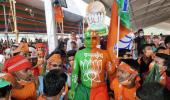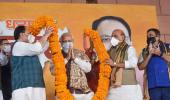'After the Congress's 2014 Lok Sabha debacle, commentators identified three major shortcomings: Leadership, organisation, and ideology.'
'Here we are six years later -- and what are the Congress's major failings? Leadership, organisation, and ideology.'
'The party seems to have learned very little during its six years in the Opposition wilderness.'

"The BJP will be more confident in fighting these upcoming elections with Modi at the helm, as opposed to a regional face. But one must recognise that individual state contests have their own dynamics and power configurations," Milan Vaishnav, Director and Senior Fellow, South Asia Programme at the Carnegie Endowment for Peace, tells Rediff.com's Archana Masih.
What have been the top takeaways from the Bihar election result?
The key takeaway has to be the continuing popularity and resonance of Prime Minister Modi and, to a lesser extent, 'brand BJP'.
The BJP went to polls behind him, de-emphasising an increasingly unpopular Nitish Kumar. And the results are there for all to see: The BJP increased its seat tally and the JD-U saw its tally shrink considerably.
A second lesson is that we are seeing some churn within the Opposition. AIMIM bagged 5 seats in Bihar.
The Left won 16 seats -- with the CPI-ML winning 11 of those.
The Congress continues to sink while the RJD showed surprising vigour under Tejashvi Yadav's leadership.
On the one hand, this is good news for the BJP because the Opposition remains fragmented and divided. On the other hand, it is evidence that the opposition has exhibited some signs of life.
I think the shared assumption that the Congress is a core pillar of any Opposition formation will continue to suffer as the party's performance suffers.
How will the verdict impact the coming polls in West Bengal and Tamil Nadu?
I am not sure there is a direct link. I suppose the BJP will be more confident in fighting these upcoming elections with Modi at the helm, as opposed to a regional face. But one must recognise that individual state contests have their own dynamics and power configurations.
The BJP feels it can unseat Mamata Banerjee in Bengal and emerge as the single largest party. I don't think it harbours the same kinds of ambitions in a state like Tamil Nadu.
Do you think the BJP's regional allies are worried about being relegated to the number 2 position when they contest future polls together?
There is no doubt that this is true -- and that this is a corollary of being a hegemonic party. As the BJP expands its national footprint, it becomes a threat to its regional allies.
This is also why it has struggled sometimes to stitch up pre-poll alliances; many other parties see it as an existential threat to their survival.
Is it just a matter of time before Nitish Kumar is asked to step down in favour of a BJP candidate?
Does he serve at the pleasure of the BJP and even though has been sworn in for the fourth time, is this his weakest hour?
Nitish is like a cat with nine lives so one can never pronounce his political career over. He is capable of reinventing himself. I do think the power balance has changed and he is on a much weaker wicket now.
In some ways, this suits the BJP just fine. He's been shown his place. But remember the BJP does not have an obvious choice for a replacement, especially now that is appears to have sidelined former deputy chief minister Sushil Kumar Modi (whose proximity to Nitish may have proved fatal).
The result has once again shown a mirror to the Congress party -- is this going to make regional parties rethink about contesting elections together with the Congress? Is the Congress spiralling out of control and out of the electoral reckoning?
After a point, this discussion starts to feel like a broken record. After the Congress's 2014 Lok Sabha debacle, commentators identified three major shortcomings: Leadership, organisation, and ideology.
Here we are six years later -- and what are the Congress's major failings? Leadership, organisation, and ideology.
All I can say is that the party seems to have learned very little during its six years in the Opposition wilderness.
Again and again, allies and partners are seeing the Congress as a liability rather than an asset. We know in states where the Congress has fallen below second largest party, it almost never finds its way back to the top.
In Bihar, it has not been the second largest party in quite some time!
Do you think the BJP is on its way to gobbling up the JD-U's space in Bihar politics? Is it only a matter of time before it can win a majority on its own and Bihar seeing a bipolar contest between BJP and RJD?
I think the trend certainly points in that direction. The JD-U won half of the assembly seats in 2010, but has been relegated to the third largest party in the 2020 race. But caste politics is a large factor and the BJP and JD-U constituencies have complimented one another historically.
The BJP will have to consider how it might make up for the loss of key non-Yadav OBC castes that the JD-U has helped deliver.
The Dalit vote is also fragmented with the LJP getting one-third of the Paswan vote, according to Lokniti-CSDS. So this kind of coalition-building is certainly necessary, if not sufficient.
Feature Presentation: Aslam Hunani/Rediff.com










